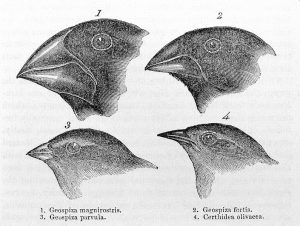Introduction – Origin of Species
On the Origin of Species is an outlier in this collection of short and influential historical documents. Unlike the other texts – as a book, published in 1859 – Charles Darwin’s ideas do not fit well here. To understand the development of nineteenth-century ideologies of empire, however, it is important to engage with Darwin directly, considering deeply what he said – and did not say – about human evolution.
On the Origin of Species introduced the world to the idea that – over the course of generations – living creatures evolved new traits through a process he called “natural selection.” The book reports and builds upon a five year scientific expedition he took on the HMS Beagle during the early 1830s through the Southern Hemisphere (stopping in South America and Australia, among other places). Darwin’s ideas were not completely new – the idea of evolution was a matter of debate at the time – but the publication of On the Origin of Species popularized the idea and helped push towards a secularization of science.
Darwin’s work was written in an imperial age. The voyage of the Beagle, for example, was part of a long standing British practice of surveying the globe and bringing vast geographies and their eco-systems under scientific study. Though this furthered scientific understanding, Britain – and other European powers – also found in these places new resources that could be cheaply exploited, fueling their country’s economic growth. By the dawn of the industrialized age, Britain procured much of the raw materials for its industrialization from global sources known as “commodity frontiers.”
To justify exploiting these commodity frontiers, Europeans and White North Americans drew upon the ideas of evolution to claim their superiority relative to the peoples whose Land or labour they coveted. Though these ideas are often labelled “social Darwinism,” their association with Darwin is somewhat distant. By the time Darwin had returned to England from his trip on the Beagle, American Samuel George Morton was just finishing up his Crania Americana (1839), a book that – by measuring brain size – there were fundamental differences between peoples and that this biological difference explained the economic dominance of Northern Europeans. In England, one of the best-known evolutionary theorists – Herbert Spencer – applied these ideas broadly, moving from biology to culture and morals. Taken together, these ideas fostered a culture of scientific racism and discrimination that used the language of evolution – or as Spencer termed it: “Survival of the Fittest” – to legitimize the power and control being claimed by Europeans and their descendants who had moved elsewhere around the world.
As you read these selections from On the Origin of Species ask yourself the following questions:
- How did explain the results of his thinking about the origin of species? How did he organize his ideas?
- To what extent can we think about this book as a revolutionary text?
- To what extent did the Origin of Species enshrine the ideas of “Social Darwinism”?
- What hopes did Darwin have for how these ideas would be used?

This module was last modified in December 2021.

